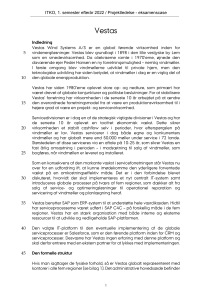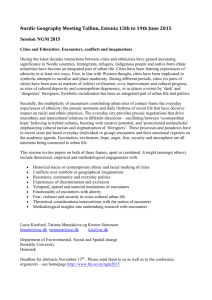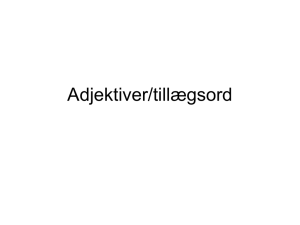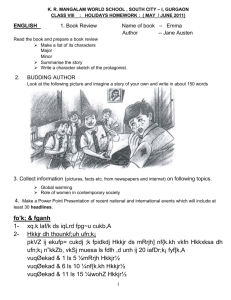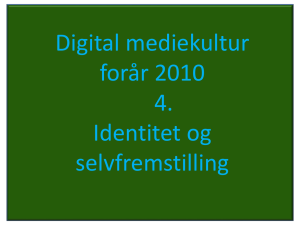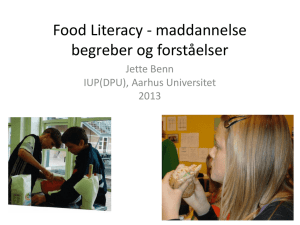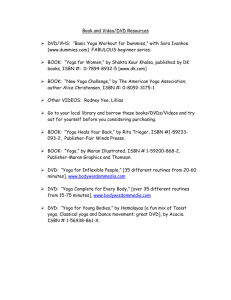1. DISTopl g 160915 Boris clj comments
advertisement
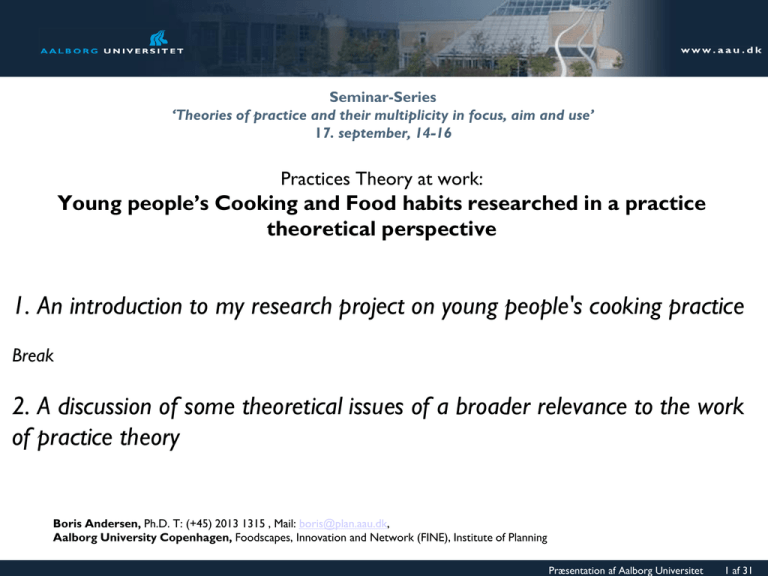
Seminar-Series ‘Theories of practice and their multiplicity in focus, aim and use’ 17. september, 14-16 Practices Theory at work: Young people’s Cooking and Food habits researched in a practice theoretical perspective 1. An introduction to my research project on young people's cooking practice Break 2. A discussion of some theoretical issues of a broader relevance to the work of practice theory Boris Andersen, Ph.D. T: (+45) 2013 1315 , Mail: boris@plan.aau.dk, Aalborg University Copenhagen, Foodscapes, Innovation and Network (FINE), Institute of Planning Præsentation af Aalborg Universitet 1 af 31 1. The problem statement of the thesis • The overall aim of the thesis was “to investigate what motivates adolescents to cook and prepare food and how their cooking practice is situated in their everyday life”. • This problem statement is followed by five research questions: 1. What do adolecents eat throughout their day? 2. How do they prepare their food? 3. How does their sense of what it takes to prepare food and get through a meal affect their cooking practice? 4. How do other doings and meal activities affect their dinner practice? 5. How is it possible to motivate adolecents- who do not like to cook- to cook? Præsentation af Aalborg Universitet 2 af 31 2. My theory Using a practice-theoretical research perspective on the young people’s cooking-practice implied two things: • First, that their cooking practice would be researched as part of its actual performance (not entity). • Second, that their cooking practice would be researched as part of the flow of other every day-life activities. Præsentation af Aalborg Universitet 3 af 31 3. Methodology and research design I • The chosen methods are qualitative- based on video recorded observation studies and interview material. • The research was carried out amongst 16 residents of a Danish dormitory, sharing amongst themselves two kitchens. • The data includes transcriptions of the 2,5 hours of interview with each of the participants, 15 hours of web-cam based video from the kitchens, as well as recordings of meal preparations. Præsentation af Aalborg Universitet 4 af 31 4. Methodology and research design II Præsentation af Aalborg Universitet 5 af 31 5. Methodology and research design III Videonummernavn: avi_20120416_3 (1.1.1.2/TB.1.1.) Optagested: Køkkenbord Resumé: Jes laver lasagne, som ikke spises på videoen. Nikolas laver burger med fremmed kvinde. Deskriptivt Deskriptivt Ingred./ret Tid Pers Hvad sker Hvad sker (i ræk.) - ikke mad - mad 00:00:00 00:33:00 Jes Han ser lidt TV2Jes går i gang med at Agurk nyheder imens han tilberede et måltid, han vil Løg laver mad; især, lave en lasagne. Han er Olie hvis han fanges af omhyggelig med skylning, Gryn (?) noget lyd. Taler og ved hvordan løg skal Hakket kød med nogen uden skæres, kvaser dem. Peberfrugt for billedet (Nik?), Kommer olie i en gryde i men ikke om mad, god tid, så olien bliver men om noget om varm, spæder op med studie. olie. Arbejder hurtigt, tjekker peberfrugts friskhed meget grundigt. Rører i gryden efter ca. 3 min, skruer ned for blusset. Skærer også peberfrugt omhyggeligt ud, kvaser altid med kniven efter at han har skåret. 00:43:38 Nikolas Nikolas stiller sig for Vasker fingre. Røre i at se på Jes, der gryden: skruer ned fortsat laver mad. Analytical approach inspired by Jordan (1995) & Knoblauch (2006) Præsentation af Aalborg Universitet 6 af 31 6. Methodology and research design IV Eksempel på Interviewudskrift #00:03:03-7# interviewer: ja ja .... men aller først sådan lidt om hvordan sådan typisk hvad du .. spiser af mad morgenmad frokost aftensmad hvordan det .. spænder af (?) #00:03:13-8# Asce: jo ... øh morgenmad .. der øh .. som regel så spiser jeg en toast #00:03:20-7# interviewer: ja #00:03:21-4# Asce: ellers så lige nu har jeg .. købt nogen fryserundstykker der var på tilbud #00:03:26-2# interviewer: ja #00:03:26-7# Asce: og så spiser jeg det med noget ost ... eller også så spiser jeg bare rugbrød med ost #00:03:33-6# interviewer: ja .. får du spist morgenmad hver morgen #00:03:34-0# Asce: ja stort set #00:03:36-8# interviewer: ja jeg skal lige du går sådan ret fast på .. skole ikke? .. alle ugens dage og mødetid klokken otte eller hvordan? #00:03:45-2# Asce: ja sådan da ikk' .. altså #00:03:47-4# interviewer: ja ... og morgenmad er det sådan noget hv- si- si- sidder du herinde eller? #00:03:52-4# Asce: jeg sidder ude i køkkenet #00:03:52-6# interviewer: ja #00:03:53-0# Asce: men det er jo sådan noget hurtigt noget som regel ikk' #00:03:56-5# interviewer: ja #00:03:57-0# Asce: med en (?) brødsmad eller en toast eller sådan noget #00:03:59-5# interviewer: ja .. og så noget fjernsyn eller hvad? #00:04:02-8# Asce: ja .. som regel så ser jeg fjernsyn .. så .. tænder jeg for News samtidig med #00:04:06-4# interviewer: ja #00:04:06-8# Asce: så står jeg og laver madpakke samtidig med jeg spiser morgenmad Analytical approach inspired by Giorgi (1979) & Kvale (2009) Præsentation af Aalborg Universitet 7 af 31 7. Conclusions I The conclusions of the dissertation are twofold: First identification of what is regarded as four different types of food preparation practices, which each in its own way is characterized by a certain coordination between a. understandings, b. procedures and c engagements and how these are carried out. The four typologies are identified: 1. The passionatet cooking practice 2. The necessary cooking practice 3. The negative ambivalent cooking practice 4. The positive ambivalent cooking practice Analytical approach inspired by Short (2006) & Halkier (2008 & 2009) Præsentation af Aalborg Universitet 8 af 31 8. Conclusions II Secoundly, my interest in young peoples cooking practice as part of the flow of their everydaylives and other activities included in their everydaylives, also made it relevant to introduce some additional findings, which I have summarized in the following: 1. The longing for routines; cooking as a source that structuring everyday life (Andersen, 2015. pp. 154-155), 2. When society’s norms for eating-rythm clash the individuals; i.e. in a situation of “lack of breakfast hunger” (ibid. pp. 80-82), 3. Hot canteen food as a potential factor in the decline of domestic cooking (ibid. pp. 82-84) 4. Healthy eating; a tendencies of the males voluntary-disclaimer for own health (ibid. pp. 159-162) 5. Food at the Television; “Looking, not Making” (ibid. pp. 150-151) Præsentation af Aalborg Universitet 9 af 31 9. Video case I “Trimming the pork” The case study illustrates i.e.: • that the lack of understanding of the procedure and knowhow can have an impact on how long the workflow takes – and can result in a larger food waste, • that the lack of understanding of the procedure and the lack of know-how can mean that the young people refrain from buying certain victuals, • that the lack of equipment management , can mean that they reject going for the optimized results. View “Trimming the pork” (8 min) Præsentation af Aalborg Universitet 10 af 31 10. Video case II: “The dangerous comes from the inside” The case study illustrates, i.e.: Choice of meats: • Choose two types of meat: chicken pieces and minced beef, not because she don’t like others sorts of meat, but because she doesn’t know how to cooked it. • Will be scared if she is not sure that the meat is well done, that's why she would rather choose to roast it: Central to the steaks is that they should not be red, therefore, she liked to cut it into small pieces. Roast on the frying pan: • Routines without understanding (checking whether the oil is hot or not, just because she has seen other doing it) • Her frying practice takes a relatively long time and requires a lot of attention, caused of lacking understanding and routines View “The dangerous comes from the inside” (6 min) “” Præsentation af Aalborg Universitet 11 af 31 11. Video case III: “To be or not to be…routinized” " The case study illustrates i.e. : • the difference between cooking in a flow and not to work in a flow • differences in the use of equipment Noticed the remarks on cooking practice in comparison with driving practice. View “To be or not to be…routinezed” (6 min) Præsentation af Aalborg Universitet 12 af 31 Break Præsentation af Aalborg Universitet 13 af 31 12. Proposals for interventions and further research Based on my findings I attempt to recommend how to support and strengthen the adolescents willingness to cook. These are manly focused on creating better – and more inspiring – facilities for collective cooking and facilitating meal- and cooking communities at dormitories. My ideas for further research is summarized as a interest of: 1. 2. 3. A deeper understanding of the connection between current meal practices, meal routines of the childhood and home economics class content. Research to follow up on initiatives aiming at supporting adolescents desire to prepare food, and by this strengthen my thesis about the ability of meal communities to motivate cooking practices. The application of the identified types of practice to different areas. Præsentation af Aalborg Universitet 14 af 31 13. Methodological reflections The theoretical and methodological reflections of my dissertation are mainly concerned with the problems regarding: 1. How is a practice delimited 2. How to bring in the materiality into play through analytical work 3. Challenges in the focus and prioritizing emerged as a consequence of the chosen explorative research design 4. That the practice theoretical perspective, which I have used cannot stand alone, but has to be supported by other theories Præsentation af Aalborg Universitet 15 af 31 14. Discussion I Materiality/body/sociality How does practice theory handle the possible interaction (the social) between people when they perform? Præsentation af Aalborg Universitet 16 af 31 15. Discussion II Routines/norms/(free)will Is there a space for "the free will" in practice theory? Præsentation af Aalborg Universitet 17 af 31 16. Discussion III Theory/empirical data/everyday-life perspective Does practice theory challenge an everyday life research perspective? Præsentation af Aalborg Universitet 18 af 31 17. A revisited practice-theoretical model Præsentation af Aalborg Universitet 19 af 31 References: Andersen, B (2015a) “Commensality between the young”. I: Kerner, S, Chou, C & Warming, B (red.) Commensality: From every food to feast: 43-49. London: Bloomsbury Publishing Andersen, B. (2015b). What motivates adolecents to cook, and how is their cooking practice situated in their everyday life. Aalborg University (Ph.D. theisis, written in Danish with an summary in English) Giorgi, A (1975). An Application of Phenomenological Method in Psychology in: A. Giorgi, C. Fischer & Murray (ed.) Duquesne Studies in Phenomenological Psychology (2): 82-103. Pittsburg Halkier, Bente & Jensen, Iben. 2008b. Det Det sociale som performativitet – et praksisteoretisk perspektiv på analyse og metode. Dansk Sociologi, nr 3/19. Halkier, Bente. 2009. Suitable Cooking? Performances and positionings in Cooking Practices among Danish Women. In Food, Culture and Society; Vol. 12, pp. 357-377. Jordan, B. & Henderson, A. 1995. Interaction Analysis: Foundations and Practice. I: The journal of the learning science, vol. 4 Knoblauch, H. (red.) 2006. Videoanalysis: Methodology and Methods – Qualitative Audiovisuel Data Analysys in Sociology. Peter Lang – Europäischer Verlag der Wissenschaften. Kvale, S. 2008. InterWiew – en introduktion til det kvalitative forskningsinterview. Hans Reitzels Forlag. Reckwitz, A. 2002. Toward a Theory of Social Practices. A Development in Culturalist Theorizing. In: European Journal of Social Theory 5: pp. 243–63. Schatzki, T. 1996. Social Practices. A Wittgensteinian Approach to Human Activity and the Social. Cambridge: Cambridge University Press. Short, F. 2006. Kitchen Secrets. The Meaning of Cooking. In: Everyday Life. Oxford: Berg. Shove, E & Pantzar, M & Watson, M (2012). The Dynamics of Social Practice: Everyday Life and how it Changes. SAGE. London. Warde, A. 2005. Consumption and Theories of Practice. In: Journal of Consumer Culture 5(2): pp.131-153. Præsentation af Aalborg Universitet 20 af 31
